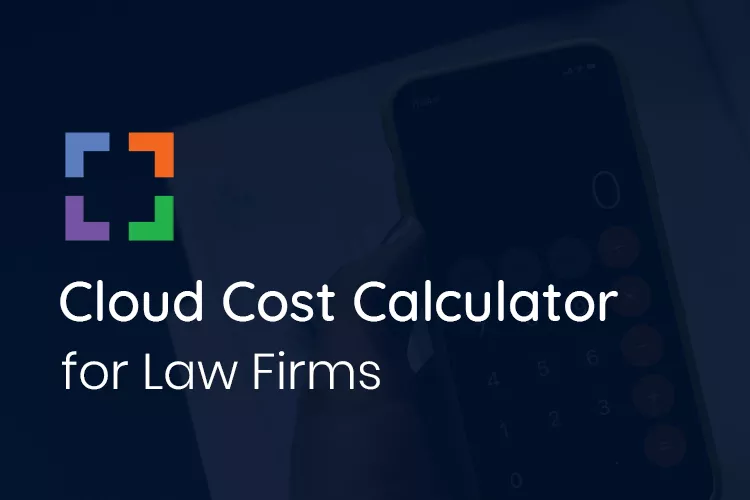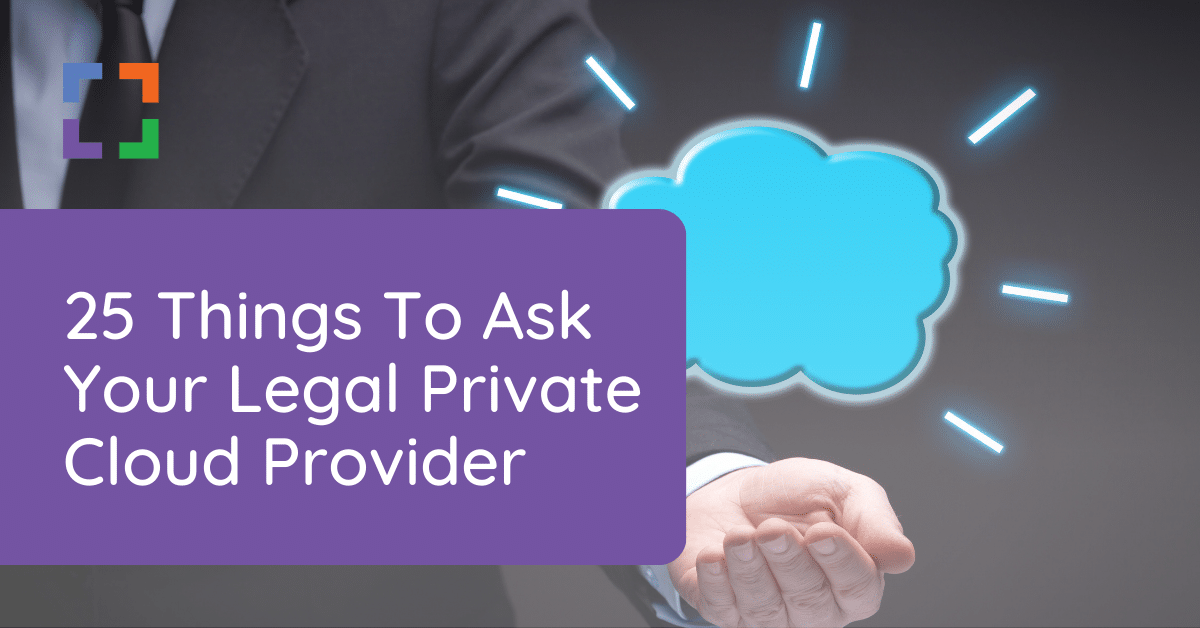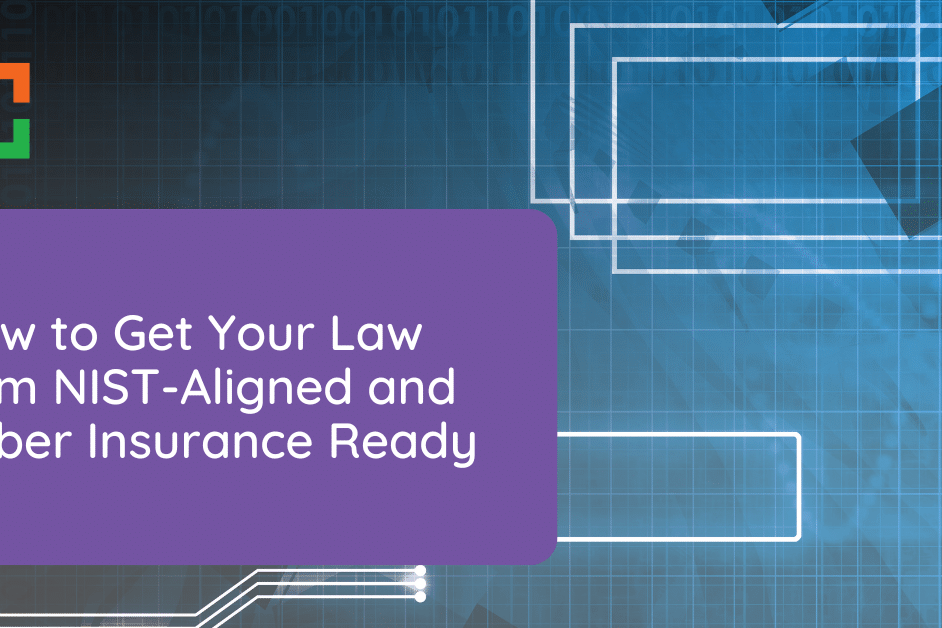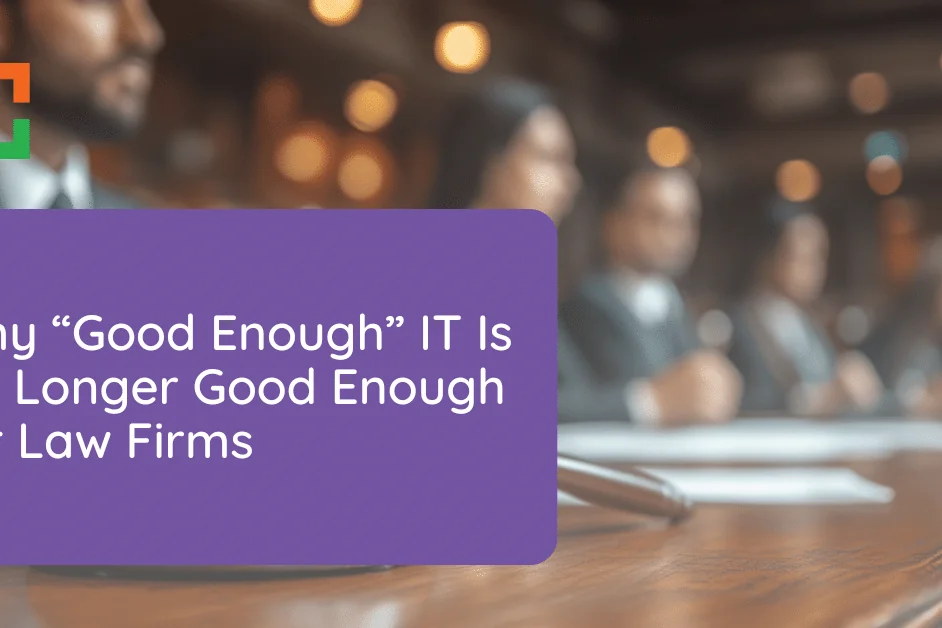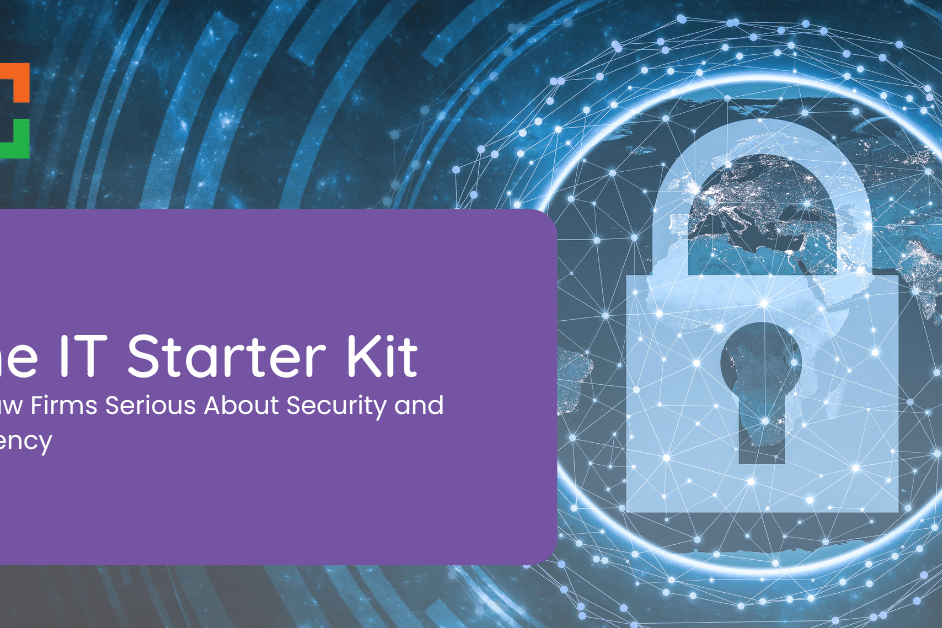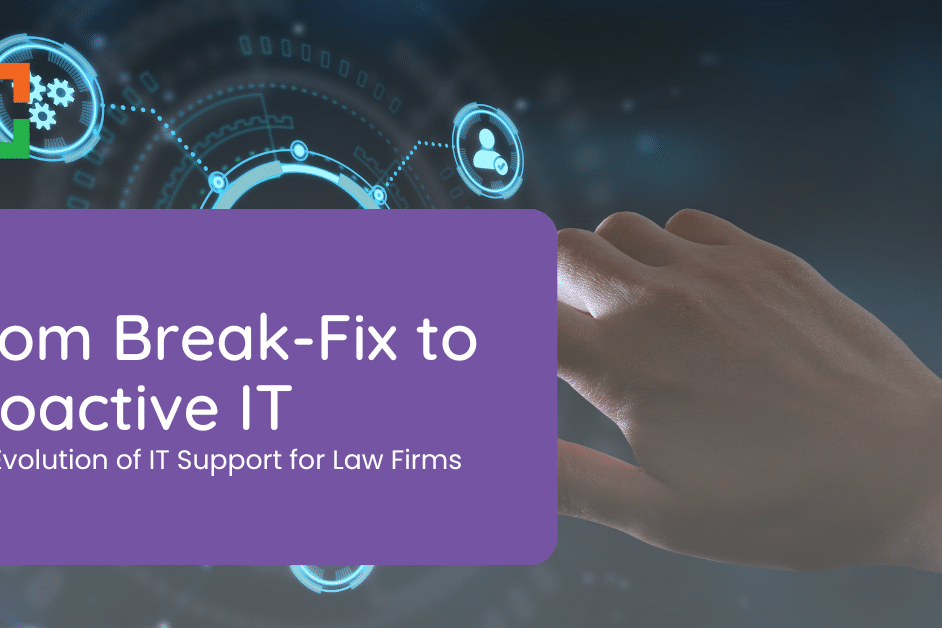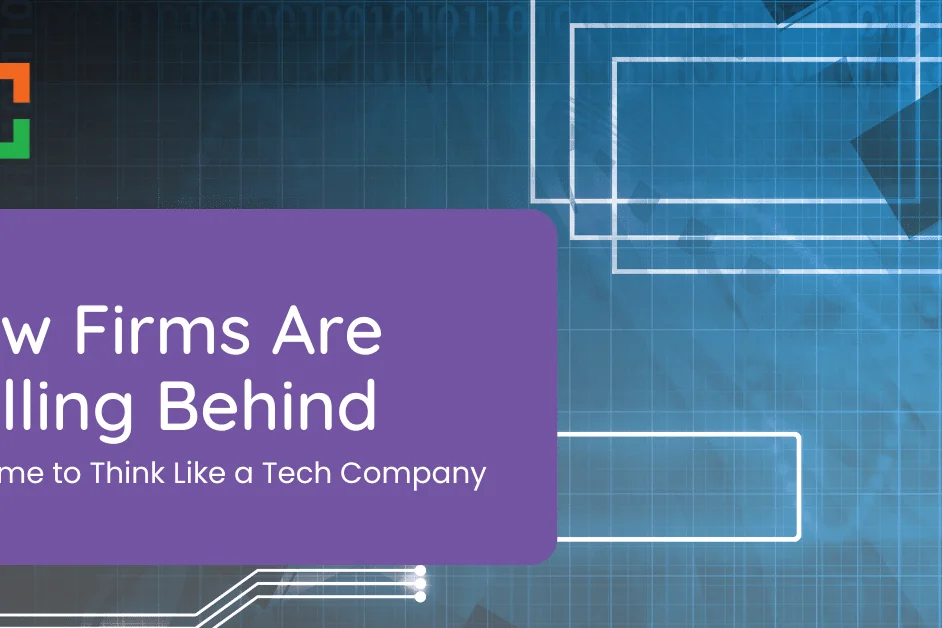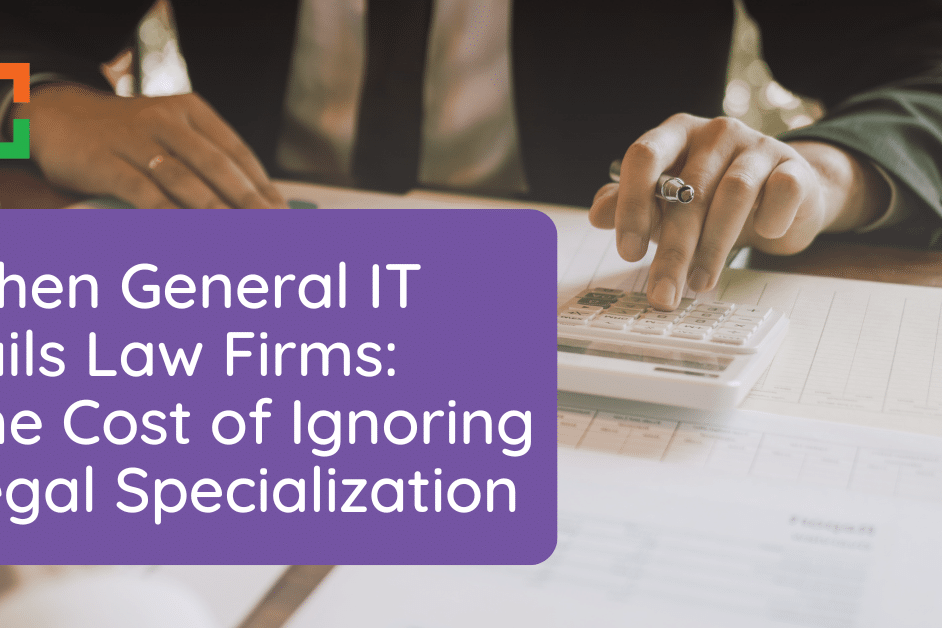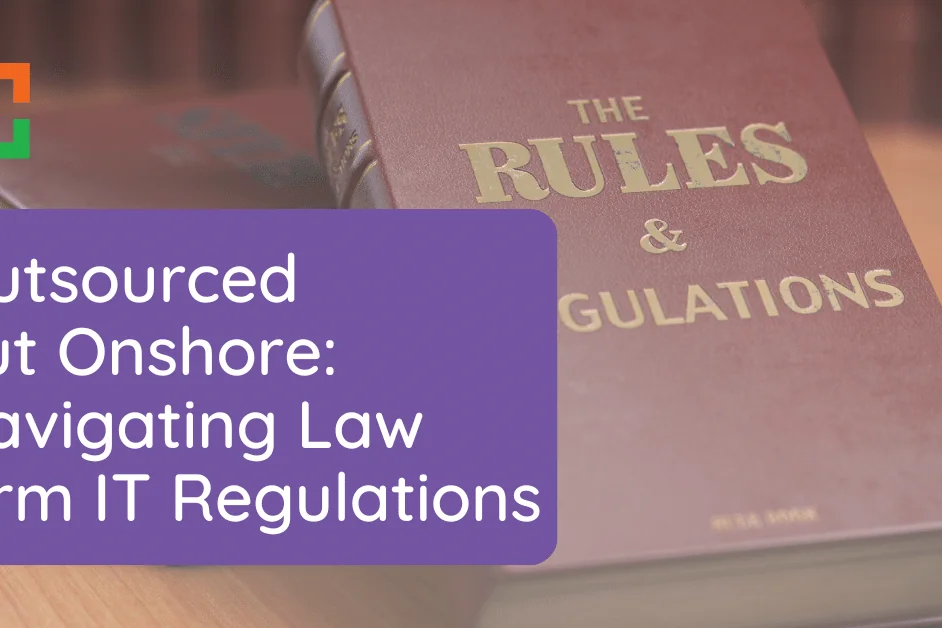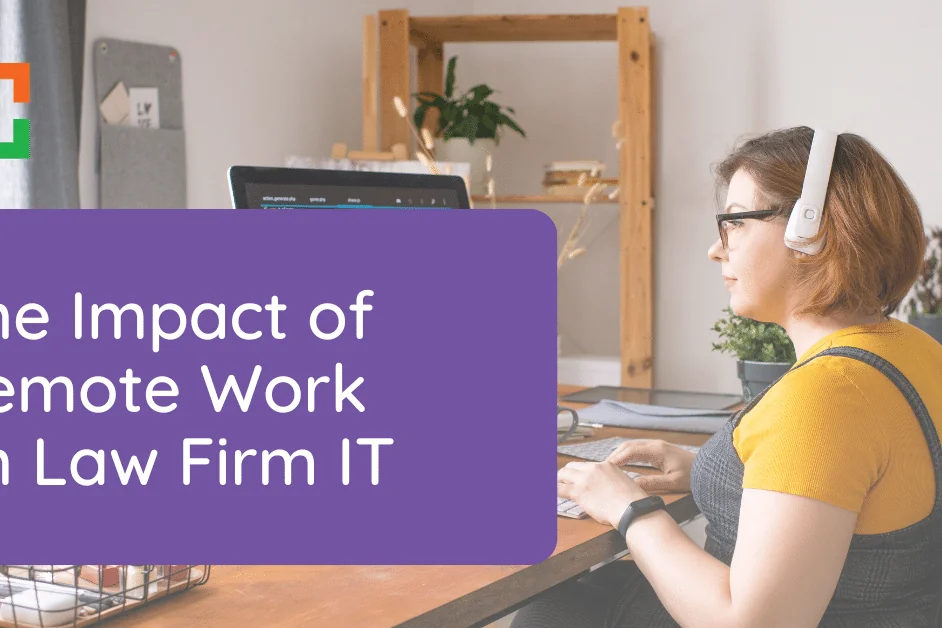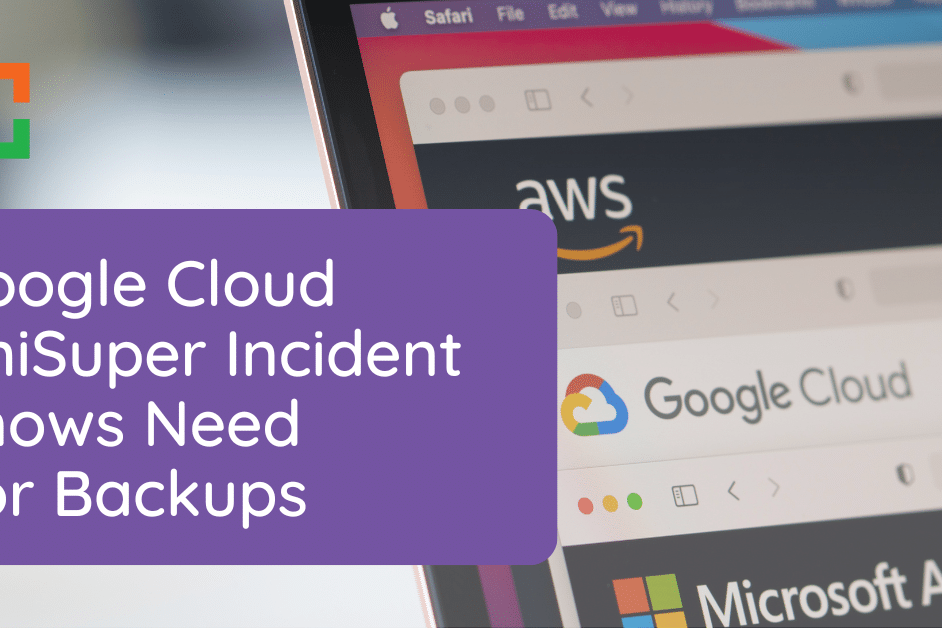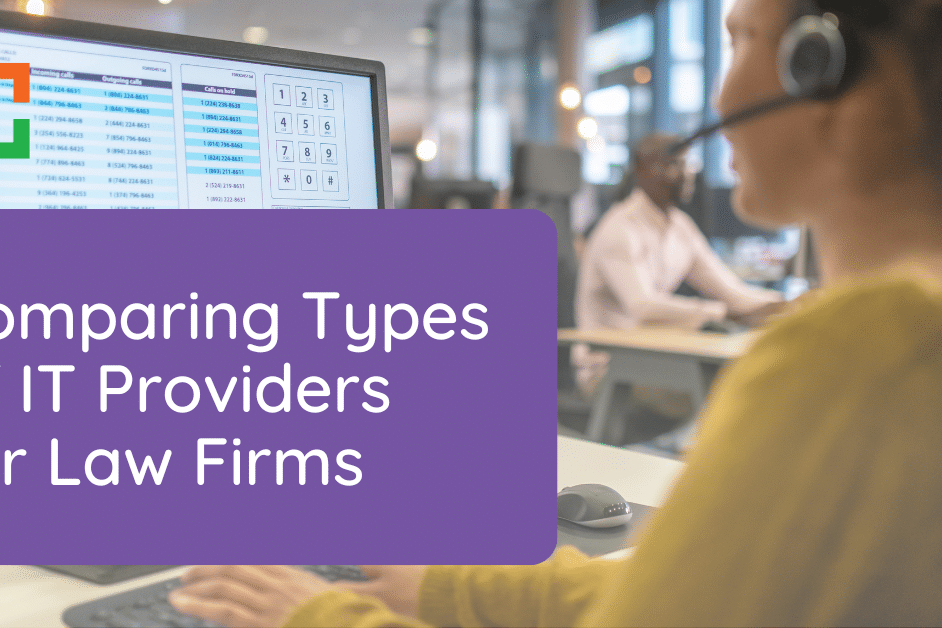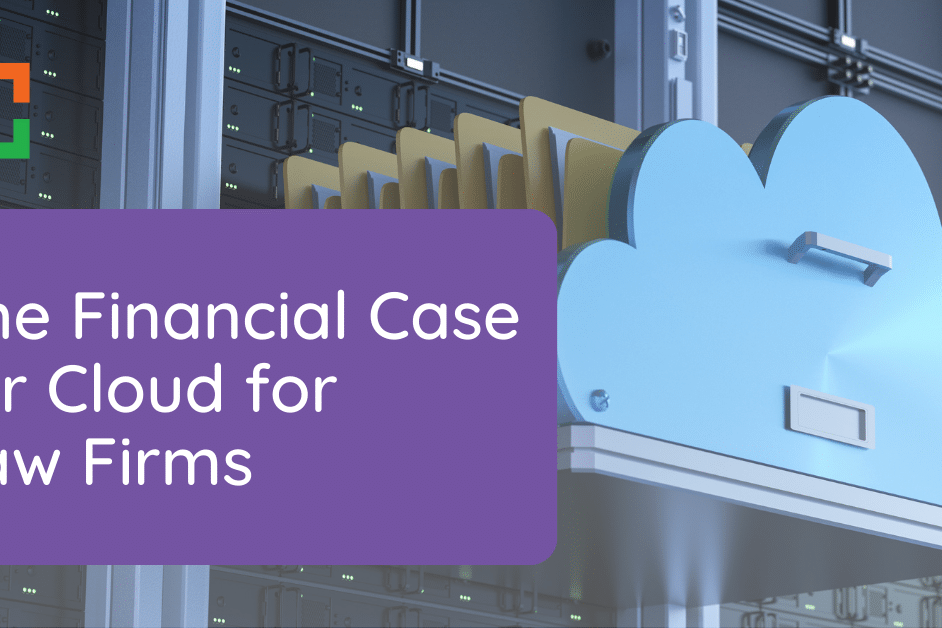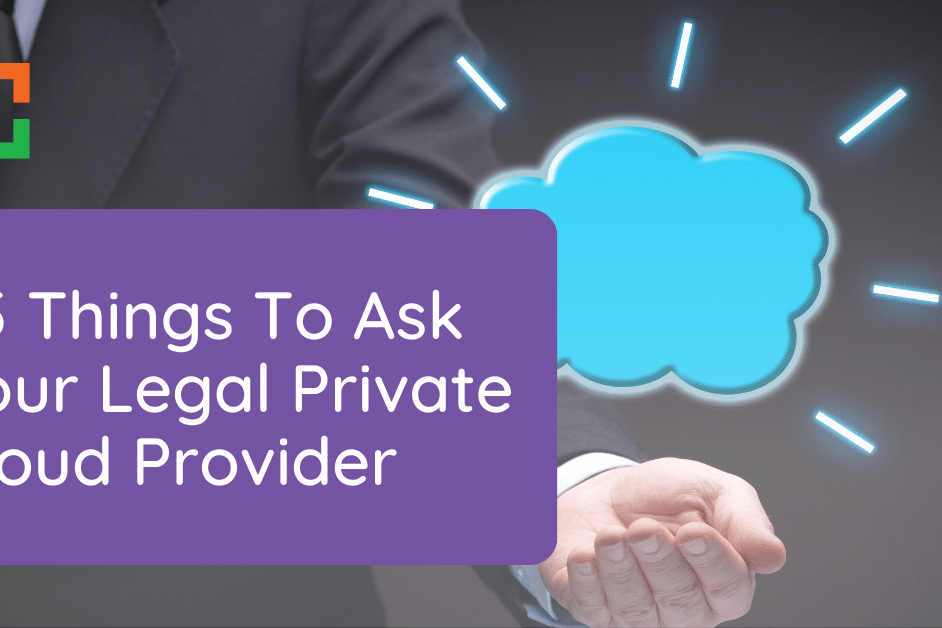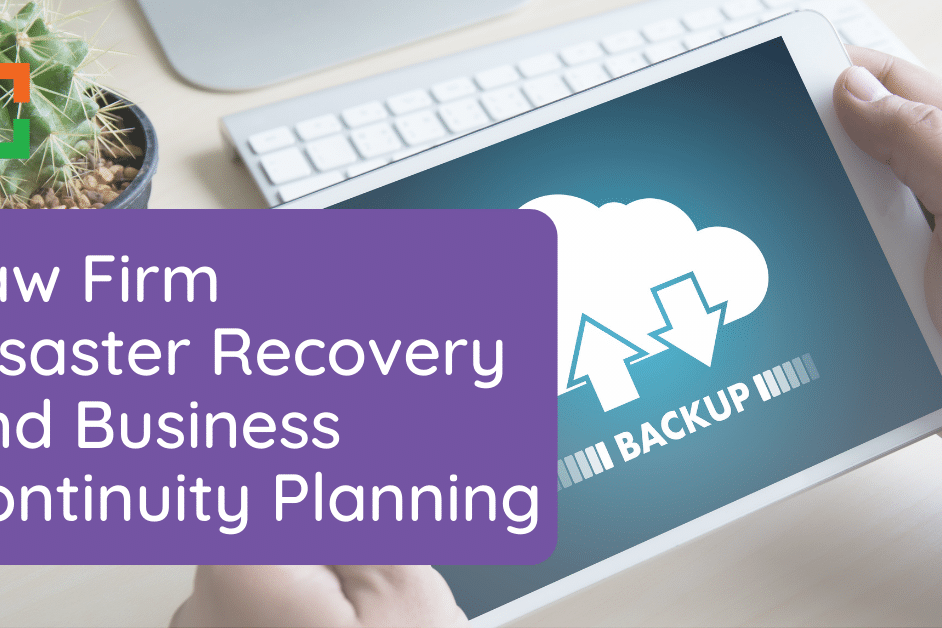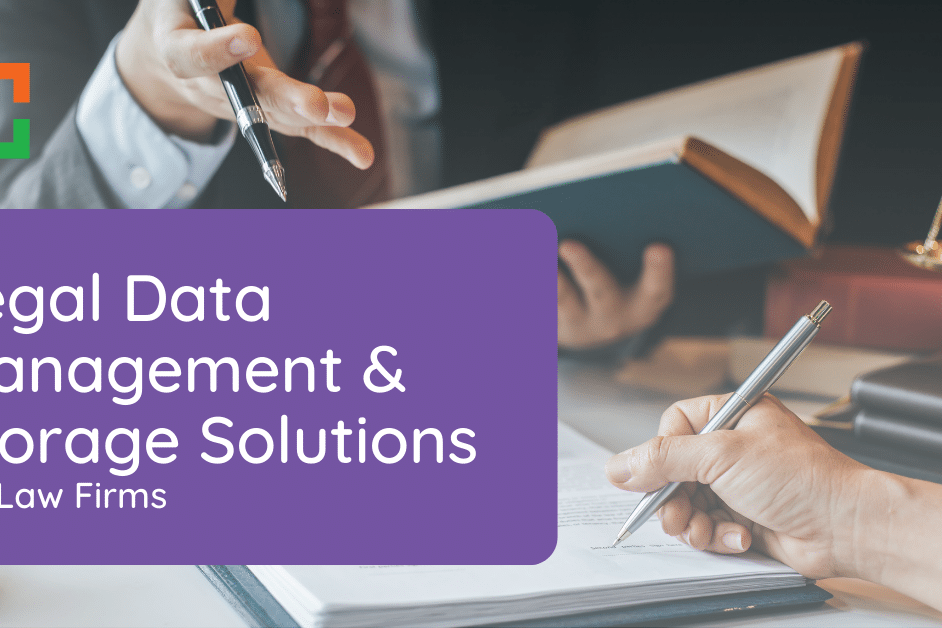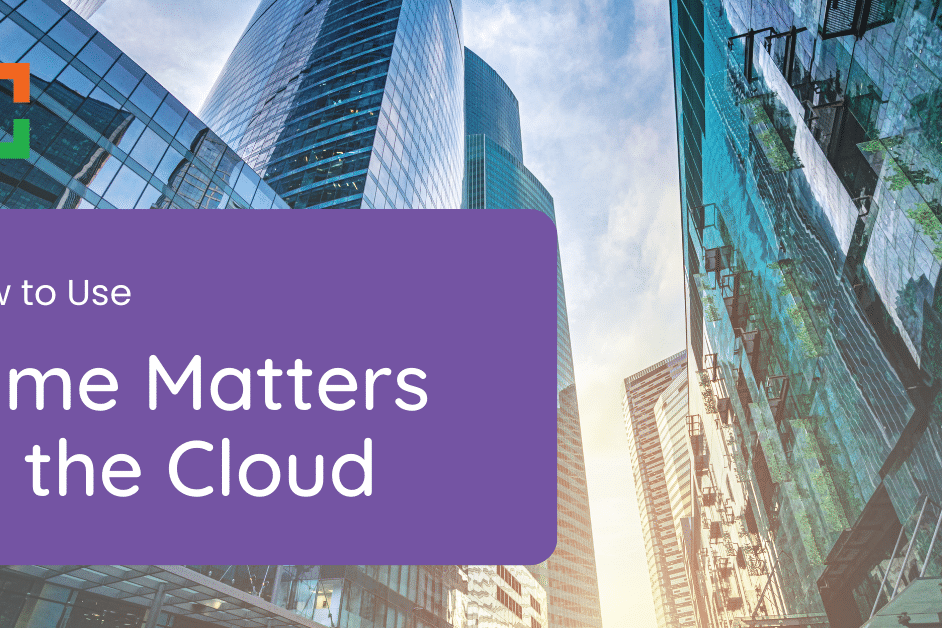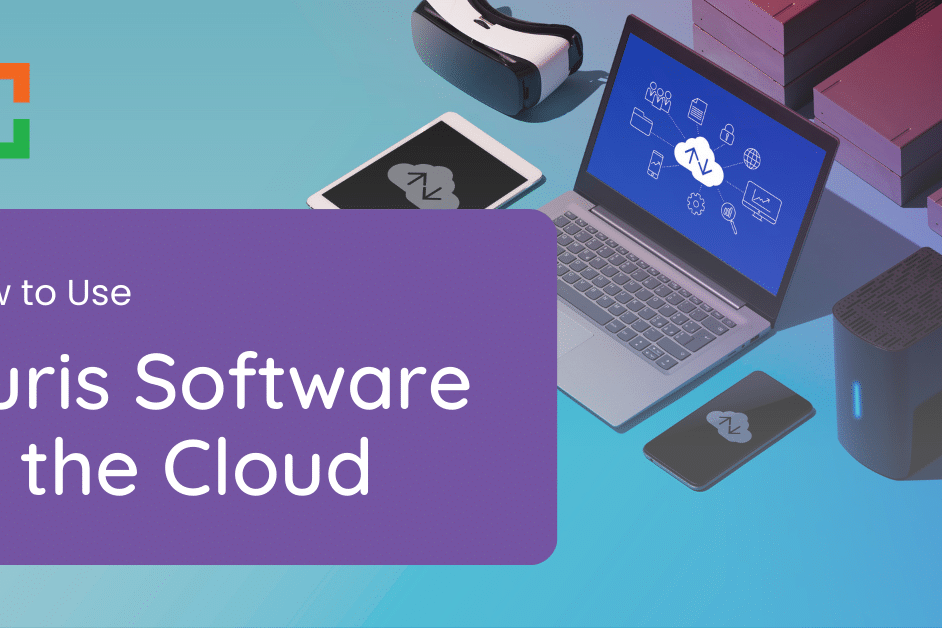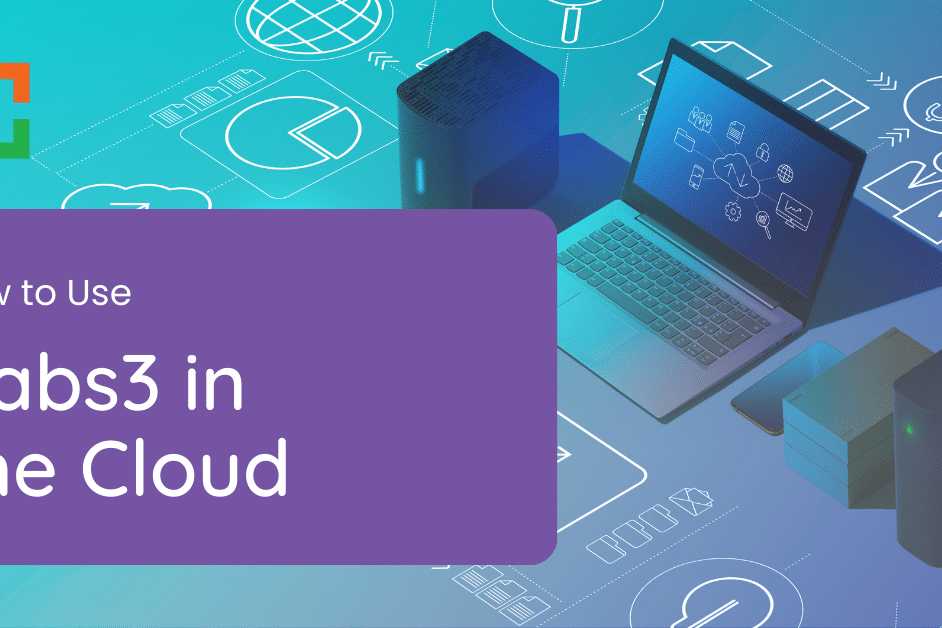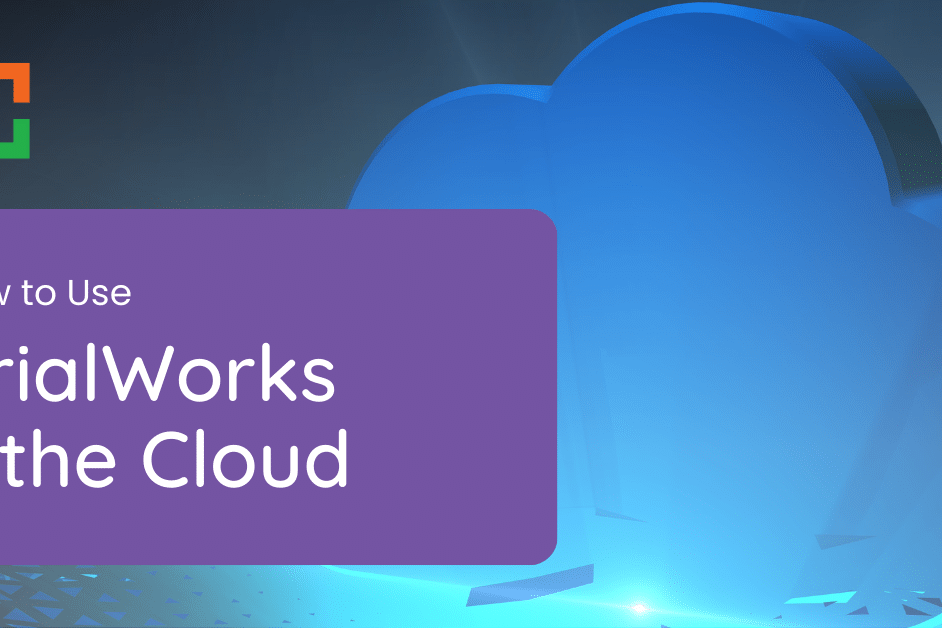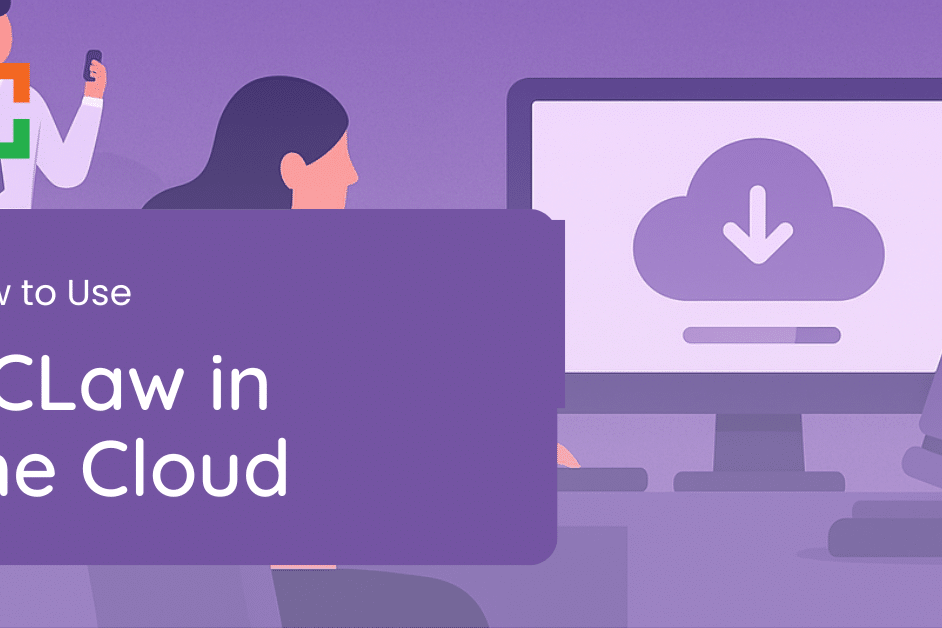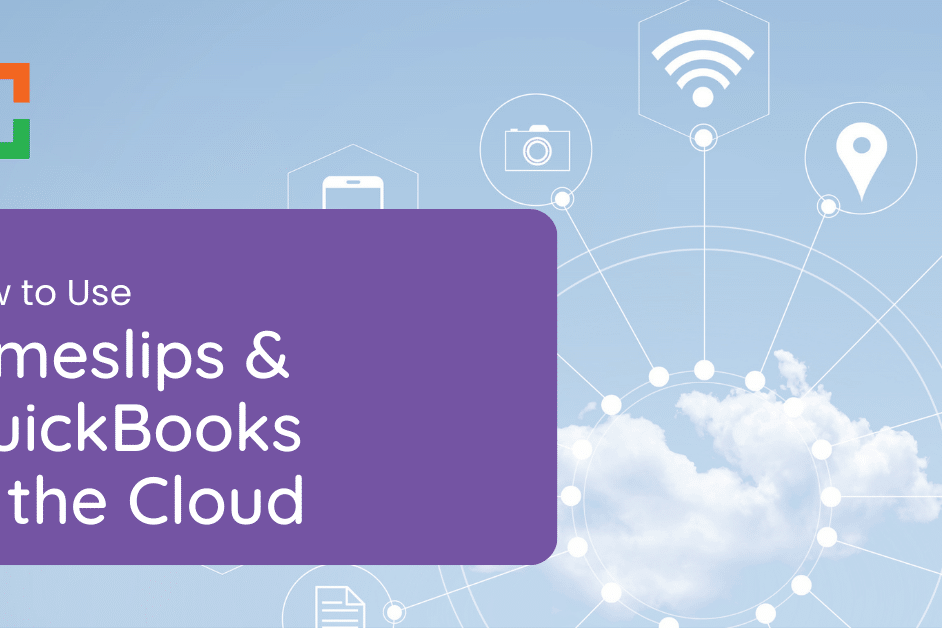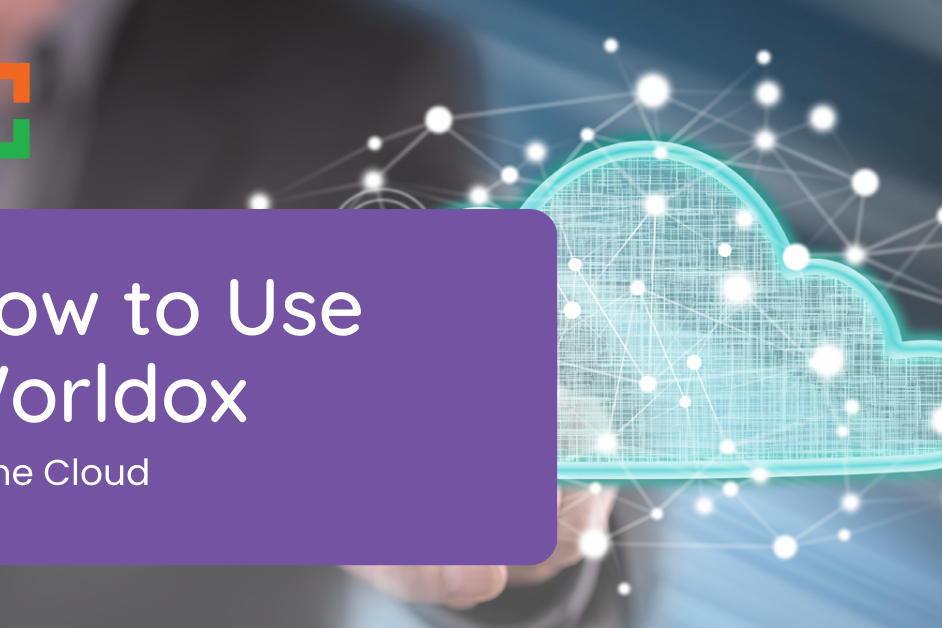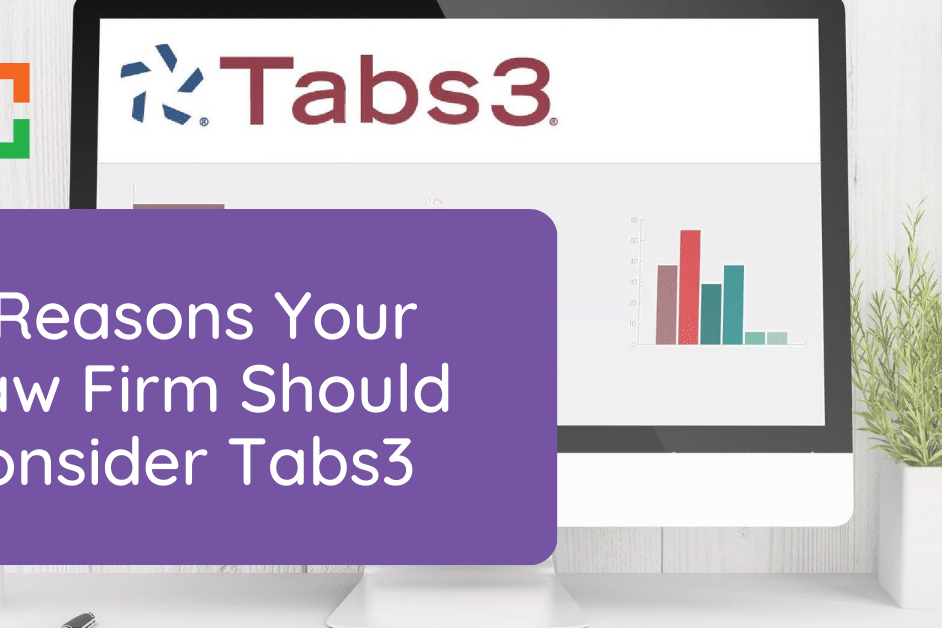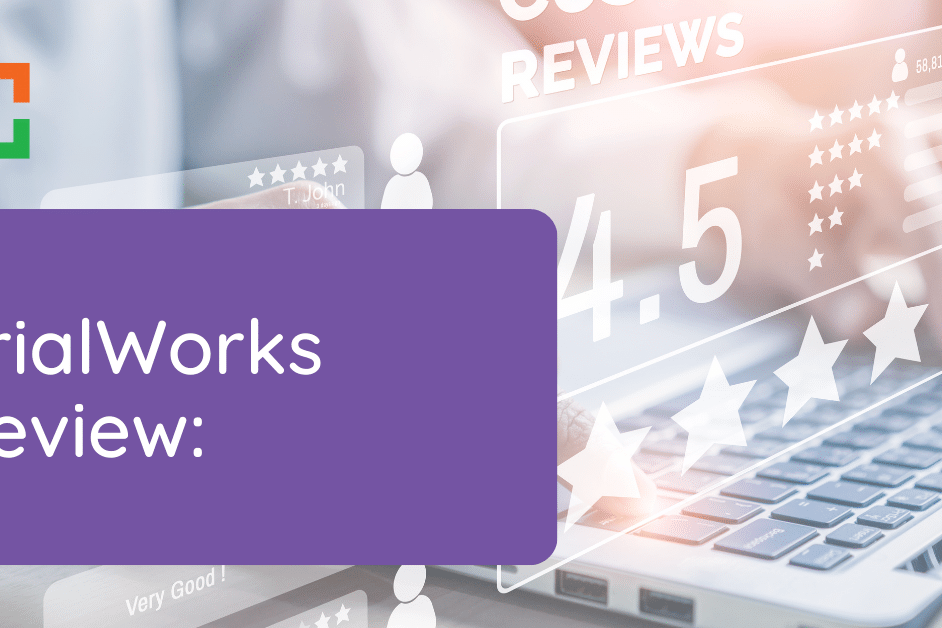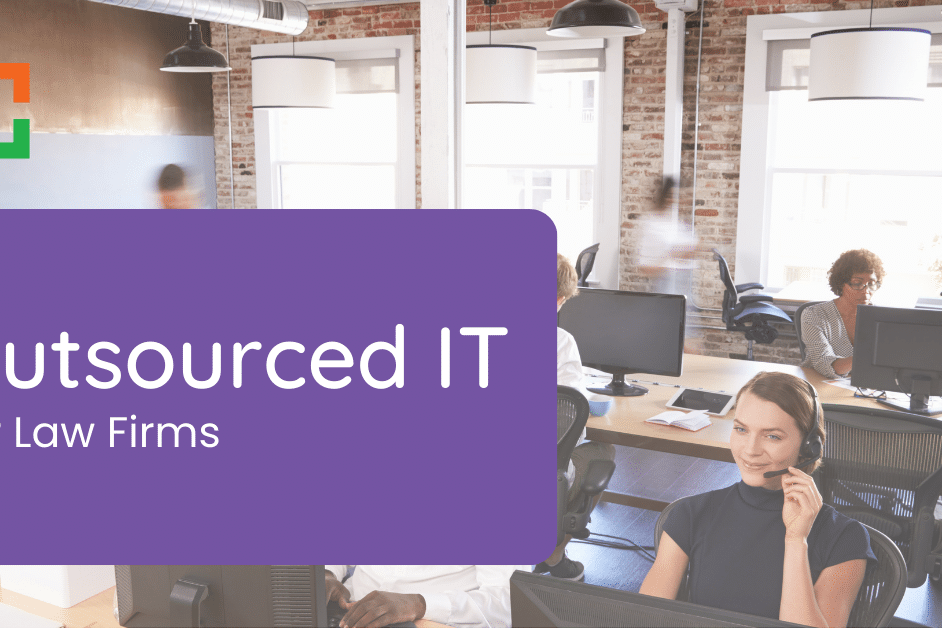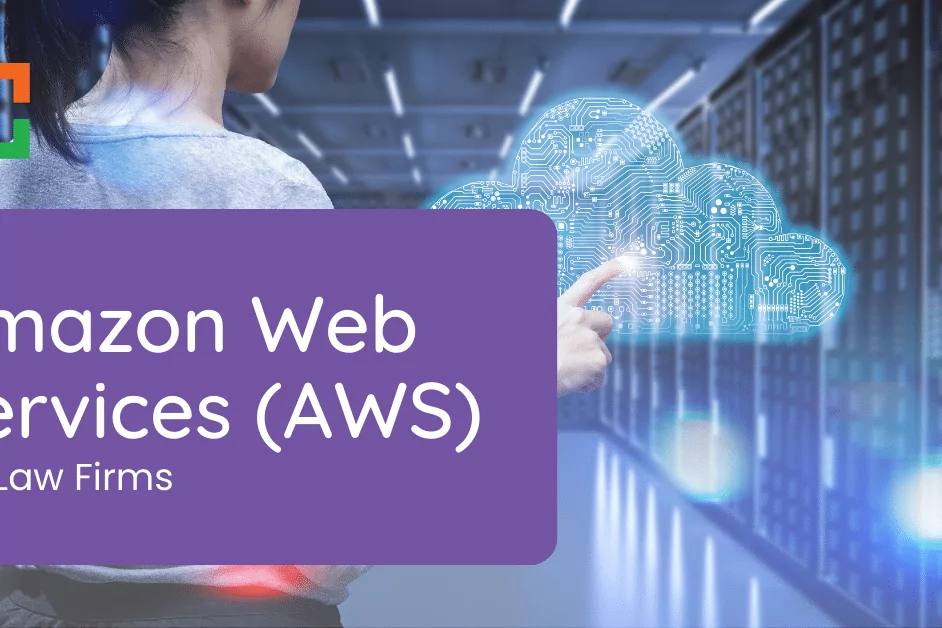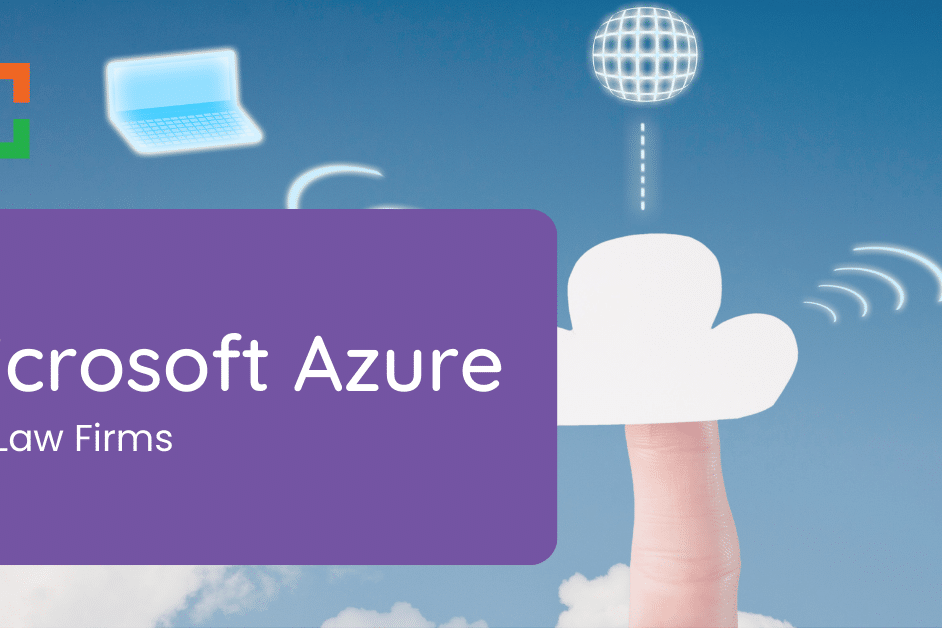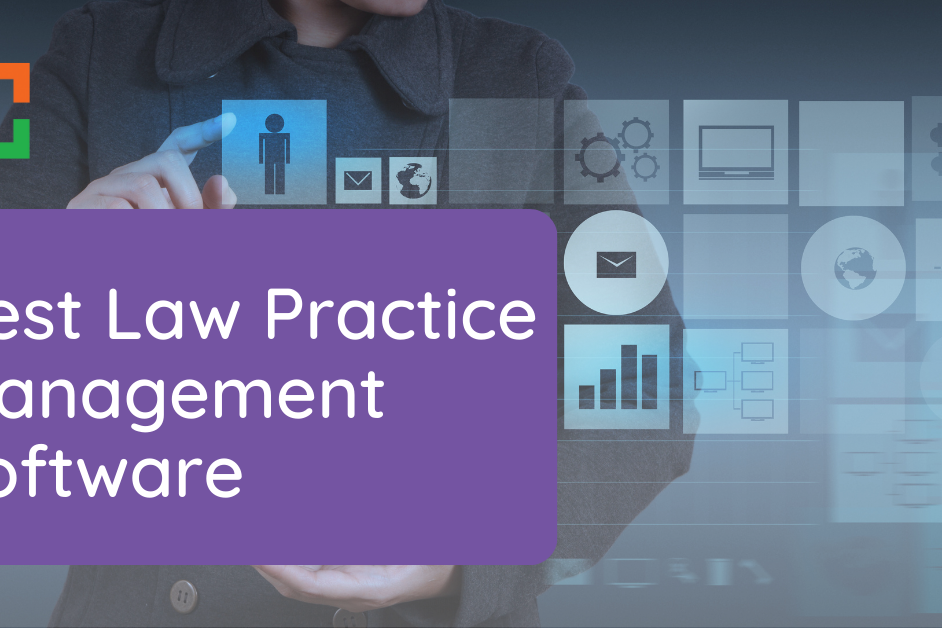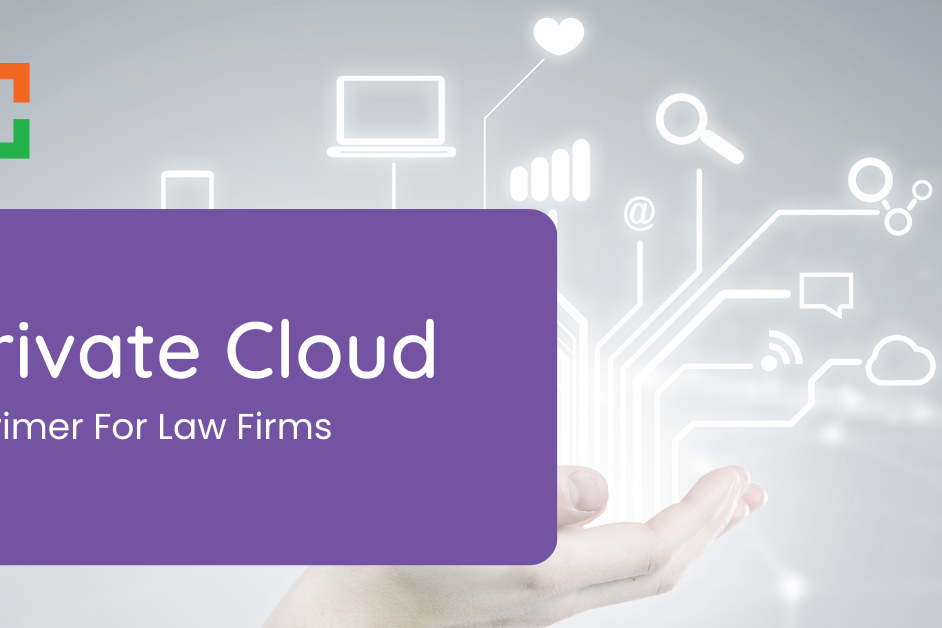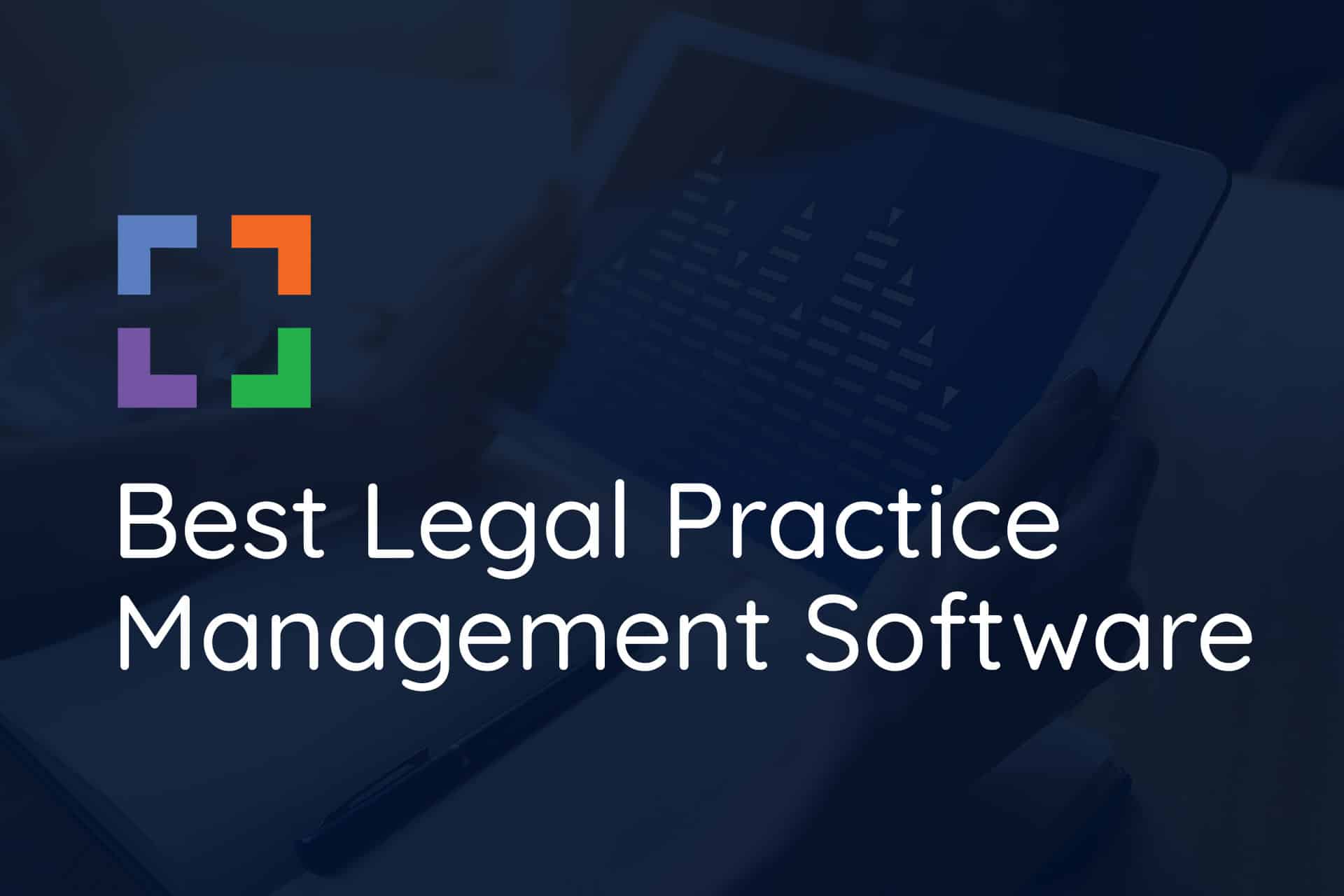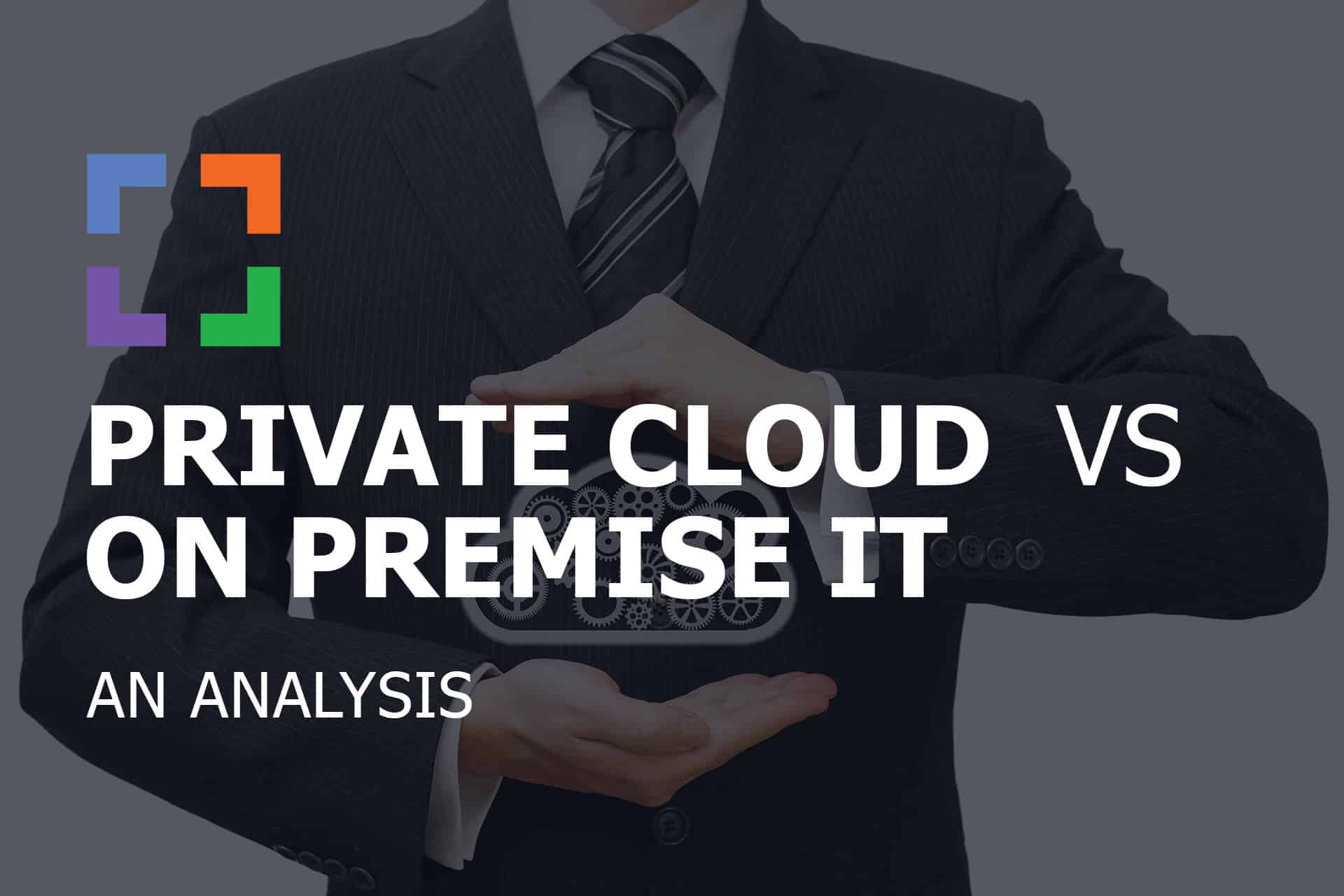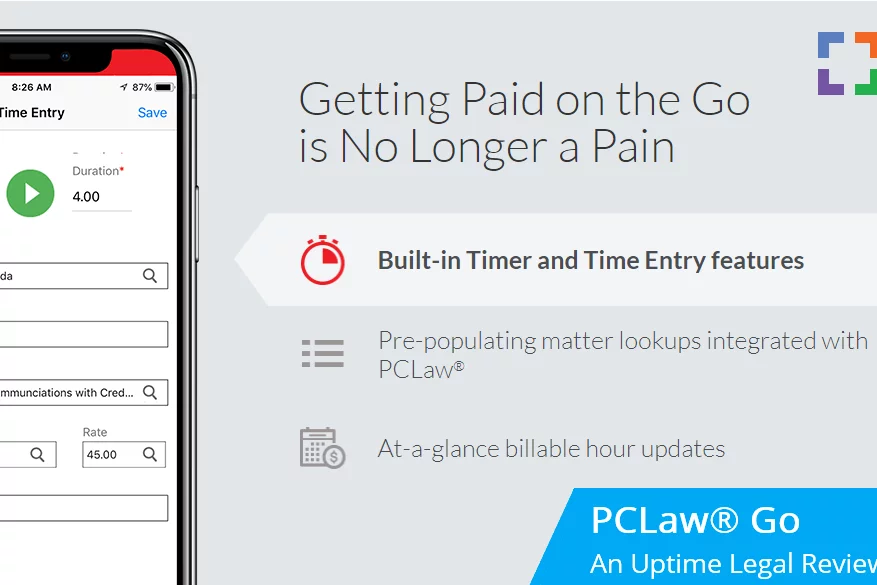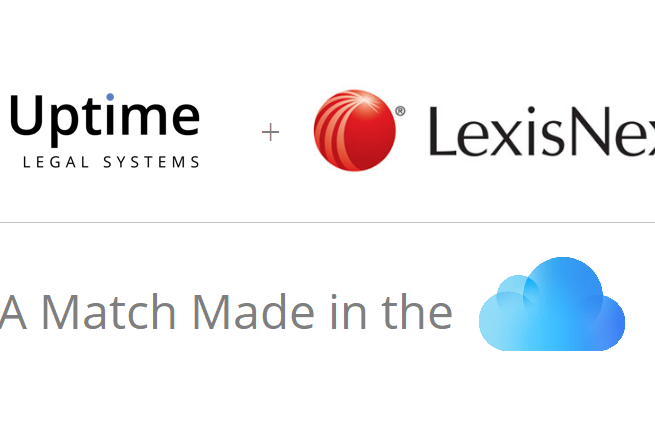Managed Cloud Services for Law firms
 Managed Cloud Services for Law Firms isn’t just a fancy term – it’s the key to staying ahead.
Managed Cloud Services for Law Firms isn’t just a fancy term – it’s the key to staying ahead.
Think of it as having a tech-savvy partner that takes care of your firm’s digital needs, so you can focus on what you do best: practicing law.
From keeping client data safe to making sure you can work from anywhere, managed cloud services are changing the game for law firms.
Let’s dive in and see what all the fuss is about!
Managed Cloud Services for Law Firms describes a specialized suite of technology solutions and support, designed to optimize law firm operations through enhanced security, scalable resources, and efficient, remote-accessible systems.
In This Article
- The Impact of Managed Cloud Services for Law Firms
- Decoding Managed Cloud Services
- Visualizing Managed Cloud Services for Law Firms
- Benefits of Managed Cloud Services in Legal Settings
- Security and Compliance: Core Pillars of Managed Cloud Services
- Choosing a Managed Cloud Service Provider for Your Law Firm
- Migrating to Managed Cloud Services: A Step-by-Step Guide for Law Firms
- Enhancing Managed Cloud Services with Robust IT Support
- Frequently Asked Questions
The Impact of Managed Cloud Services for Law Firms
Picture this: A bustling law firm, where attorneys navigate through piles of case files and struggle with outdated systems, suddenly shifts to a world where documents are a click away, and collaboration happens in real-time, no matter where they are.
This isn’t a glimpse into the future; it’s the reality that managed cloud services bring to law firms today.
By turning to these specialized tech solutions, law firms are not just upgrading their IT infrastructure; they’re redefining how legal work is done. In this seamless digital environment, efficiency isn’t just improved; it’s transformed.
This transformation goes beyond mere convenience – it’s about empowering legal professionals with tools that match the pace and complexity of modern law.
So let’s explore how managed cloud services are not just changing, but revolutionizing the landscape of legal practice.
Move Your Legal Software to the Cloud
With Uptime Practice
- Cloudify Your Legal Software
- Expert Legal Software Hosting/Support
- Cloud Storage for Documents + Data
- End-to-End Security
- Office 365 + IT Support (Optional)
Related – IT Support for Law Firms: Having readily-available support relieves the burden and stress of law firms’ technology stack. Learn more.
Decoding Managed Cloud Services
What are managed cloud services for law firms?
It’s much more than just a tech upgrade – they’re a strategic ally in the digital age.
These services are a blend of cloud computing resources like servers and storage, combined with the expertise of a dedicated team managing them. Unlike traditional IT setups, where law firms had to juggle software updates, hardware issues, and cybersecurity threats on their own, managed cloud services streamline this entire process.
They’re like having an expert tech team on call, ensuring that the firm’s digital infrastructure is always up-to-date, secure, and tailored to the unique needs of legal practice.
With these services, law firms can focus on their cases and clients, confident that their tech backbone is strong, reliable, and cutting-edge.
Data Storage and Management
They offer robust data storage solutions, tailored to handle the large volumes of sensitive information typical in legal practices.
This includes regular backups, disaster recovery plans, and data encryption.
Bonus: use document management software, like LexWorkplace, to ensure your managing your data optimally.
Customized Software Services
From case management to document handling, cloud services offer a range of legal-specific software that is continually updated and integrated seamlessly into the firm's workflow.
Advanced Server Solutions
Managed cloud services provide sophisticated server technologies that are maintained, updated, and secured by the service provider.
This ensures high performance and reliability for all the firm's data needs.
Without cloud services, you're looking at outdated methodologies of utilizing software, such as owning and operating your own servers in-house. This leads to much more burden than going with managed cloud services for law firms, along with unnecessary costs and maintenance.
For example, take a look at the chart below to understand what server ownership means for your firm over the course of the next 7 years.
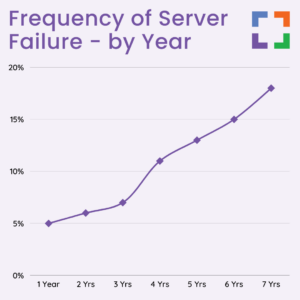
As you can see, not only do servers require a substantial upfront investment, but the frequency of server failure starts at 5% and increases with each year. At the 4-year mark, the chance of failure doubles and nears 20% by the 7th year.
Cybersecurity and Compliance
Proactive monitoring and advanced security protocols protect against cyber threats.
Compliance with legal industry standards (like GDPR and HIPAA) is meticulously managed, ensuring the firm’s operations meet all regulatory requirements.
Scalable Resources
As the firm grows, so do its technological needs.
Managed cloud services can scale up or down, providing the right amount of resources as required, without the need for significant capital investment.
On-Demand IT Support
Immediate access to IT expertise means technical issues are resolved quickly, minimizing downtime and maintaining continuous operations.
When you maintain your software on-premise, through your own servers, your IT setup and support process is more complex and often more expensive.
Take a look at the flow chart below to understand the process you would have to go through each time you need a new software, new servers, or updates.
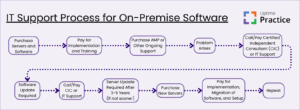
However, if you decide to pursue a cloud-hosted solution, your setup process is more simple and your IT support is both easily and readily available.
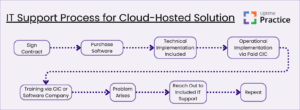
Remote Access and Mobility
Lawyers can securely access the firm’s system from anywhere, facilitating remote work and ensuring continuity and flexibility.
Customization and Integration
Services are tailored to the specific needs of the firm, ensuring a perfect fit with existing processes and systems.
Integration with other tools and platforms is also managed, creating a cohesive and efficient tech environment.
By utilizing these features, law firms can focus on their core legal work, confident that their technological infrastructure is not only state-of-the-art but also perfectly aligned with their specific professional needs.

Uptime Practice was a true miracle when the pandemic struck. We moved to Uptime Practice and were working immediately.
Todd Tracy – The Tracy Law Group, PLLC
Visualizing Managed Cloud Services for Law Firms
In the past, law firms were anchored to physical servers for operating essential practice management and accounting software like ProLaw, PCLaw, Time Matters, Tabs3, or even Timeslips and QuickBooks.
This traditional approach required substantial investments in physical servers and ongoing IT management, posing both logistical and financial challenges.
Now, the technological paradigm has shifted towards the private cloud, a specialized, hosted IT environment designed specifically for the unique demands of legal practices.
This modern solution effectively replaces the conventional server, serving as a singular, secure hub for all of a law firm’s software, data, and communication needs.
How Private Clouds Transform Law Firm IT:
- Dedicated Server Environment: A private cloud functions as a bespoke server for your law firm, tailored to host and manage all your legal and administrative applications.
- Seamless Data Transition: The transition involves moving your firm’s data, documents, and potentially email systems from on-premise servers to these private cloud servers.
- Legal Software Expertise: A competent private cloud provider is not just an IT expert but also a specialist in legal software, ensuring optimal installation, support, and maintenance.
- Comprehensive IT Management: With a private cloud, the responsibility for backups, updates, cybersecurity, and overall IT health shifts from the firm to the provider.
- Universal Access and Convenience: Lawyers and staff can access their work environment anywhere, using virtual desktops that house all necessary tools, including legal software, document systems, and email.
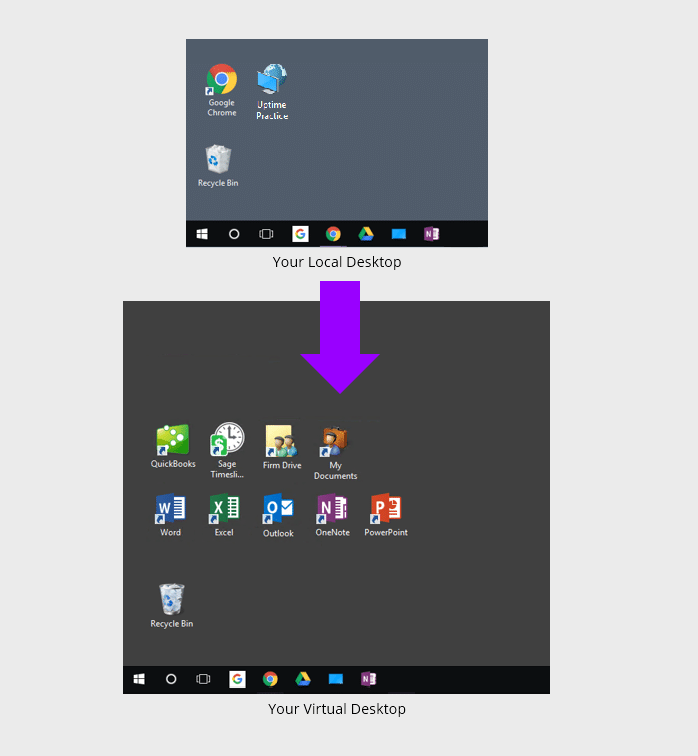
The introduction of private clouds in law firms offers several strategic benefits:
- Elimination of Physical Servers: Reduces the need for hardware investments and physical space for servers.
- Anywhere, Anytime Work Capability: Enhances flexibility and productivity by allowing staff to work remotely.
- Expert Legal Software Support: Provides specialized support for legal applications, ensuring they run smoothly and efficiently.
- Increased Reliability: Cloud infrastructures are typically more reliable and robust compared to physical servers located on-site.
- Predictable IT Budgeting: Transforms variable IT costs into fixed, predictable expenditures. This allows you to plan for expenses more reliably, so you have minimal surprise costs (or none). Take a look at the table below to get a better understanding of the differences.
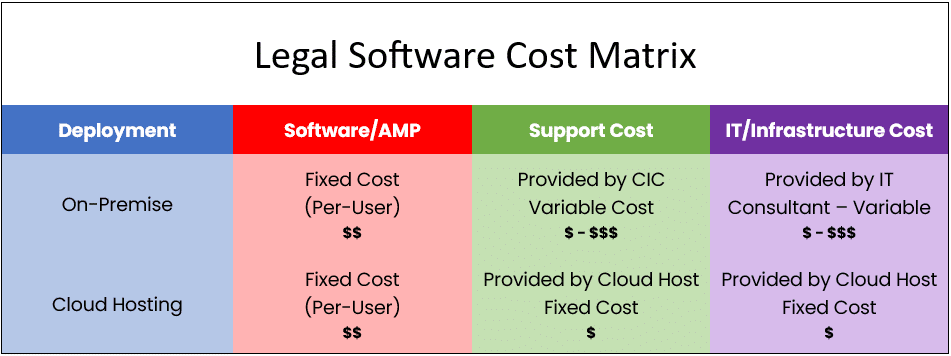
In essence, the transition to private clouds represents a significant leap forward in legal IT.
It not only simplifies technology management for law firms but also aligns their operations with the dynamic, increasingly digital nature of modern legal practice.
By adopting this innovative approach, law firms can ensure they remain competitive, agile, and responsive to both client and market demands.
Take a look at what cloud-hosting looks like through Uptime Practice Foundation.
Benefits of Managed Cloud Services in Legal Settings
The adoption of managed cloud services in law firms unlocks a myriad of benefits, fundamentally changing how legal professionals work.
Let’s dive into some of these key benefits.
Enhanced Data Accessibility
Lawyers can access files and documents from any location, ensuring critical information is always at their fingertips.
This facilitates quicker decision-making and client communication.
Improved Collaboration
Real-time document sharing and editing capabilities enable team members to work together seamlessly, regardless of geographical barriers.
This leads to more cohesive case management and streamlined workflows.
Operational Flexibility
Managed cloud services easily adapt to the changing needs of a law firm, scaling resources up or down based on demand.
This flexibility is key for managing varying caseloads efficiently.
Cost-Effectiveness
By reducing the need for physical infrastructure and in-house IT management, managed cloud services lower overhead costs.
This transition to a more predictable, subscription-based model helps in better budget management.
Robust Security
Advanced security protocols protect sensitive client data from cyber threats, ensuring compliance with legal data protection standards.
Disaster Recovery and Data Backup
Regular backups and robust disaster recovery plans ensure that critical legal data is protected and quickly recoverable in case of any data loss incidents.
Scalable Storage Solutions
As law firms grow, their data storage needs change. Managed cloud services offer scalable storage solutions that can accommodate expanding data requirements without significant capital investment.
Streamlined IT Management
Managed cloud services take the burden of IT management off the law firm's shoulders, allowing lawyers to focus more on their legal practice rather than tech concerns.
By focusing on these benefits, law firms can leverage managed cloud services to not only improve their day-to-day operations but also to secure a competitive advantage in the legal market.
Would You Rather: Serve Clients or Manage IT?
Use Uptime Practice Next for:
- Unlimited IT Support
- Legal Software Consultation
- Cloud Storage
- Security Protection
- Data Backups
- and More!
Security and Compliance: Core Pillars of Managed Cloud Services
In the world of legal services, where client confidentiality and data security are paramount, managed cloud services shine as a beacon of assurance.
These services offer robust security protocols, which are crucial for protecting sensitive client data from ever-evolving cyber threats. Think of them as a digital fortress, safeguarding the integrity and confidentiality of legal information.
Moreover, compliance is a non-negotiable aspect in the legal sector.
Managed cloud services are adept at navigating the complex web of industry regulations, ensuring that law firms stay compliant with standards like GDPR, HIPAA, or other relevant legal data protection laws.
This compliance is not just about following rules; it’s about building trust with clients and maintaining the firm’s reputation.
Through managed cloud services, law firms can achieve a balance between stringent security measures and rigorous compliance requirements, setting a foundation of trust and reliability in their client relationships.
Choosing a Managed Cloud Service Provider for Your Law Firm
Selecting the right managed cloud service provider is a pivotal decision for any law firm.
Here are key factors to consider:
Security & Compliance
Investigate their security certifications and compliance with standards like ISO 27001.
Assess their history in handling data breaches or security incidents. A provider with a strong security background is crucial for maintaining client confidentiality and protecting sensitive case information.
Likewise, verify their experience in dealing with legal compliance issues and their ability to ensure your firm remains compliant.
Cost Structure and Transparency
Understand their pricing models – whether it’s pay-per-use, subscription-based, or a fixed cost.
Ensure there are no hidden fees and that the pricing structure is clear and predictable.
It's important that the cost aligns with your firm's budget and provides value for the services offered.
Related – Cloud Cost Calculator for Law Firms: Figure out how much the cloud will cost you and enjoy seeing the results of savings.
Service and Support
Examine the level of support offered.
This includes the availability of customer service (24/7 support, response times) and the quality of technical assistance.
A good provider should help you resolve issues swiftly and provide proactive maintenance.
Scalability and Flexibility
Your provider should offer scalable solutions that grow with your firm.
This includes the ability to increase storage, add users, and expand capabilities without significant disruptions or costs.
Expertise in the Legal Industry
Choose a provider who understands the nuances of legal work.
They should be familiar with legal workflows, document management needs, and the specific challenges law firms face.
This industry-specific expertise ensures the cloud solution is tailored to your firm's unique requirements.
Related: Learn more about law firm software you could host through a legal-focused cloud host.
By delving into these factors, law firms can make a well-informed decision, selecting a managed cloud service provider that best fits their operational needs and strategic objectives.
Related – 25 Things To Ask Your Legal Private Cloud Provider: Knowing what to ask will ensure that you end up with the best solution for your cloud needs.
Migrating to Managed Cloud Services: A Step-by-Step Guide for Law Firms
Migrating to managed cloud services is a significant step for any law firm.
Here’s a structured approach to ensure a smooth transition:
1
Assessment and Planning
Begin with a thorough assessment of your current IT infrastructure.
Identify what needs to be moved to the cloud and any specific requirements or challenges.
Develop a detailed migration plan that includes timelines and milestones.
2
Choosing the Right Service
Based on the assessment, select the appropriate cloud services that meet your firm’s needs.
This should align with the factors discussed in the previous section.
3
Data Preparation and Backup
Before migration, ensure all data is properly backed up.
Cleanse and organize the data to facilitate a smooth transition.
4
Implementation
Start the migration process as per the plan.
This might be done in phases to minimize disruption. Ensure that all data is securely transferred and integrated with the new cloud environment.
5
Testing and Validation
After migration, thoroughly test the new environment to ensure that all applications and data are functioning as expected.
Validate the security and compliance aspects.
6
Training and Support
Provide comprehensive training to your staff on the new system.
Ensure ongoing support is available to address any issues or questions that arise.
7
Post-Implementation Review
Finally, conduct a post-migration review to ensure all objectives have been met and identify areas for improvement.
By following these steps, law firms can ensure a successful migration to managed cloud services, positioning themselves for enhanced efficiency and growth.
Enhancing Managed Cloud Services with Robust IT Support
Integrating robust IT support with managed cloud services amplifies their effectiveness.
Here’s how law firms can maximize this integration:
- 24/7 Monitoring: Ensure continuous monitoring for any security threats or performance issues, keeping the cloud environment secure and efficient.
- Regular Updates and Maintenance: IT support should provide regular software updates and system maintenance, ensuring the cloud infrastructure remains up-to-date and functional.
- On-Demand Technical Assistance: Access to expert technical support when needed helps in resolving issues quickly, minimizing downtime.
- Training and User Support: IT support can offer training sessions for staff, ensuring they are proficient in using the cloud services and can troubleshoot basic issues.
- Data Management and Backup: Support in managing data effectively, including regular backups and recovery plans, is crucial for data integrity.
- Customization and Scalability: Assistance in customizing cloud services to meet specific needs of the firm and scaling resources as per demand.
- Compliance Management: IT support can help in maintaining compliance with legal regulations, an essential aspect for law firms.
By leveraging these support services, law firms can fully capitalize on the benefits of managed cloud services, ensuring a smooth, secure, and efficient digital working environment.
Frequently Asked Questions
Managed cloud services for law firms are specialized IT services that provide cloud-based solutions tailored to the unique needs of legal practices, including data storage, security, and software management.
They enhance operational efficiency, facilitate remote work, improve data security, streamline collaboration, and ensure compliance with legal industry standards.
Yes, these services provide robust security measures including encryption and regular security audits to protect sensitive legal data.
Absolutely, one of the key advantages is scalability, allowing firms to adjust resources based on their current needs and growth.
Key considerations include the provider’s legal industry expertise, security credentials, compliance capabilities, cost structure, and the quality of customer support.
Migration involves assessing current IT infrastructure, selecting appropriate services, transferring data securely, and providing training and support to staff.
Yes, they offer a cost-effective solution by reducing the need for in-house IT infrastructure and providing scalable services based on the firm’s size and budget.
Providers are equipped with expertise in legal industry regulations and ensure that the firm’s cloud environment adheres to necessary legal standards like GDPR and HIPAA.
Uptime Practice:
The IT & Cloud Platform for Law Firms.
Uptime Practice is a suite of Managed IT and cloud services, made exclusively for law firms.
Practice Next
Technology + Legal Software Support for Modern Law Firms
Practice Next is a suite of Managed IT, Legal Software Support, and Cloud Essentials, made just for law firms.
-
Practice Next is a suite managed IT, technology essentials and legal software support.
-
Practice Next includes unlimited IT and legal software support, Microsoft 365, legal-centric cloud storage and more.
-
Practice Next pairs great with cloud-based legal software such as Clio Manage, CosmoLex, MyCase and more.
Practice Go
Cloudify Your Legal App
Does your law firm already have a cloud strategy, but have one premise-based application still running on onsite servers? Practice Go is for you.
- With Practice Go, we effectively turn your desktop/server- based legal software into a cloud application (a Published App), freeing your firm from the limitations of traditional software.
- Practice Go can cloudify your PCLaw, Time Matters, Tabs3, ProLaw, Juris, QuickBooks and more.
Practice Foundation
Complete Private Cloud for Law Firms
If your law firm needs a central, secure cloud platform for all of your legal software, documents and data, Practice Foundation is for you.
-
Practice Foundation is an end-to-end cloud platform that will host all of your firm's applications and documents, and will optionally include Office 365 + unlimited IT support. Everyone in your firm logs into a Virtual Desktop where they'll find all of their apps and docs.
-
Practice Foundation works with PCLaw, Time Matters, Tabs3, ProLaw, Juris, QuickBooks, Timeslips, TrialWorks, Adobe Acrobat and more.
Not Sure Which Edition You Need?
No problem. Check out our quick Comparison Chart for Uptime Practice, or Get in Touch to talk with our sales team.

Dennis Dimka
As the founder and CEO of Uptime Legal Systems, I've had the privilege of guiding our company to become a leading provider of technology services for law firms.
Our growth, both organic and through strategic acquisitions, has enabled us to offer a diverse range of services, tailored to the evolving needs of the legal industry.
Being recognized as an Ernst & Young Entrepreneur of the Year Finalist and seeing Uptime Legal ranked among the Inc. 5000 list of fastest-growing private companies in America for eight consecutive years are testaments to our team's dedication.
At Uptime Legal, we strive to continuously innovate and adapt in the rapidly evolving legal tech landscape, ensuring that law firms have access to the most advanced and reliable technology solutions.
Related Posts
January 20, 2025
5 IT Mistakes that Expose Law Firms to Cyber Threats
September 26, 2024
Outsourced but Onshore: Navigating Law Firm IT Regulations
June 27, 2024
The Impact of Remote Work on Law Firm IT
May 29, 2024
The Real Value of Legal Specialty in IT Services
April 24, 2024
Comparing Types of IT Providers for Law Firms
April 1, 2024
The Financial Case for Cloud for Law Firms
March 8, 2024
25 Things To Ask Your Legal Private Cloud Provider
March 5, 2024
How to Use ProLaw in the Cloud in 2025
February 28, 2024
Law Firm Disaster Recovery and Business Continuity Planning
February 22, 2024
Types of IT Services for Law Firms
February 8, 2024
Legal Data Management & Storage Solutions for Law Firms
February 1, 2024
How to Choose the Right IT Provider – A Guide for Law Firms
January 9, 2024
VoIP for Law Firms
January 8, 2024
How to Use Orion Legal Software in the Cloud in 2025
January 8, 2024
How to Use Time Matters in the Cloud in 2025
January 8, 2024
How to Use Juris in the Cloud in 2025
January 8, 2024
How to Use Tabs3 in the Cloud in 2025
January 8, 2024
How to Use TrialWorks in the Cloud
January 8, 2024
How to Use PCLaw in the Cloud in 2025
January 8, 2024
How to Use Timeslips & QuickBooks in the Cloud in 2025
December 15, 2023
How to Use Worldox in the Cloud in 2025
December 15, 2023
7 Reasons Your Law Firm Should Consider Tabs3
December 15, 2023
ProLaw Workspace – Review & Guide for Law Firms
December 15, 2023
TrialWorks – An Uptime Legal Review
December 15, 2023
Cybersecurity for Law Firms
November 15, 2023
Outsourced IT for Law Firms
November 9, 2023
Managed IT Services for Law Firms
October 24, 2023
AWS for Law Firms: A Complete 101
October 11, 2023
IT Support for Law Firms
October 4, 2023
Azure for Law Firms: A Complete 101
September 28, 2023
Best Law Practice Management Software (2025)
September 5, 2023
Juris Support – How to Get Help for Juris
August 30, 2023
Tabs3 Support – How to Get Help for Tabs3
August 23, 2023
ProLaw Support – How to Get Help for ProLaw
July 24, 2023
PCLaw Support – How to Get Help for PCLaw
July 20, 2023
Private Cloud 101 for Law Firms
February 24, 2021
Uptime Legal Joins the Thomson Reuters Marketplace
November 18, 2019
Best Legal Practice Management Software for 2021
September 16, 2019
The Financial Case for Cloud for Law Firms
June 17, 2019
Law Firm IT – What Are Your Options?
June 10, 2019
5 Things to Require of Your Law Firm IT Provider
January 28, 2019
PCLaw® Go – An Uptime Legal Review
January 7, 2019
Time Matters® Go – An Uptime Legal Review
October 24, 2017

